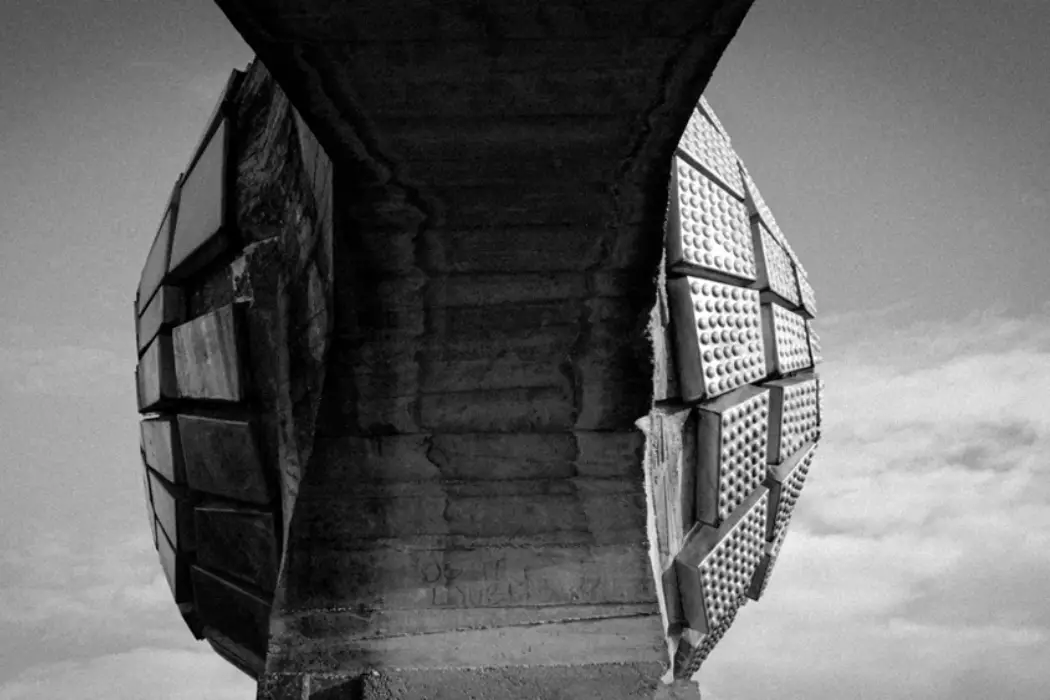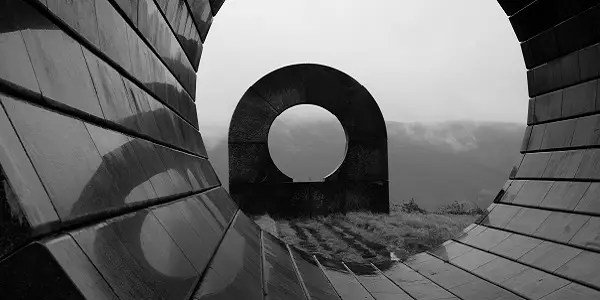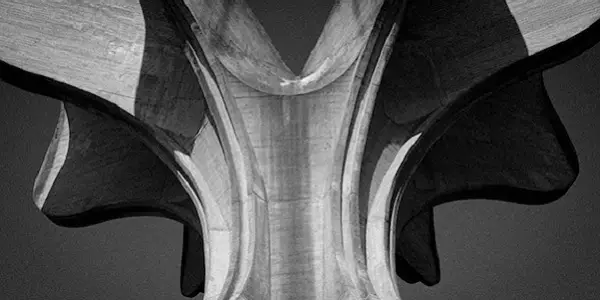LAST AND FIRST MEN: Hauntingly Prescient Science-Fiction

Lee Jutton has directed short films starring a killer toaster,…
Icelandic composer and musician Jóhann Jóhannsson may be best known to moviegoers for his many collaborations with director Denis Villeneuve, including his original scores for Arrival and Blade Runner 2049, but with Last and First Men, one sees that he had a knack for telling surreal science-fiction stories himself. Based on the 1930 novel of the same name by British author Olaf Stapledon, the story of Last and First Men is told in the form of a missive from the future from the last human species left in the universe, narrating the long and winding tale of their rise and fall as they hover on the edge of extinction.
Jóhannsson originally presented Last and First Men as a multimedia project at the 2017 Manchester International Festival, combining film footage narrated by Tilda Swinton with a score performed by the BBC Philharmonic. After his sudden, tragic death in 2018, fellow composer and musician Yair Elazar Glotman completed the project, making Last and First Men Jóhannsson’s first and only feature film as a director. The result is a haunting, philosophical view of the distant future that feels disturbingly prescient in its depiction of humanity’s destruction.
Heading Off-World
No living humans appear on screen in Last and First Men; the film almost entirely consists of strangely beautiful black-and-white footage of the many World War II monuments and memorials erected across the former Yugoslav republics during the Communist era. Forming stark silhouettes against blank horizons, the dark hues of the stones standing in sharp contrast to the washed-out whites and greys of the skies, these abandoned monuments are all that remains of a world that no longer exists. As shot by Norwegian cinematographer Sturla Brandth Grøvlen (Victoria, Another Round), one could easily believe that this is an entirely different planet from ours; the film’s surreal soundscape, as created by Jóhannsson and Glotman, only emphasizes the otherworldly feel.

As the camera glides smoothly — indeed, almost ghostly — around the stone slabs, Swinton’s narration relays the epic saga of creation and destruction that has led humanity to these final moments. Early twenty-first-century humans, known as the First Men, engaged in global war and environmental destruction until the only inhabitable parts of Earth were the North and South Poles. (One cannot help but shudder at how all-too-familiar it already feels.) Eventually those, too, were abandoned, first for Venus — where humans committed genocide against the native species in order to terraform the planet for their own uses — and later for Neptune.
The End of the End
As humanity continued to evolve, they began to experiment with creating artificial species, human forms vastly superior physically and intellectually to the lowly First Men. Yet even as humankind finally reaches its peak in the Last Men (the eighteenth version of the species, if you’re still counting), they find themselves unable to avoid annihilation. The sun has grown so hot that it is burning through the rest of the solar system faster than the Last Men can escape. It’s a tragic tale of human folly, a reminder that there’s no room for utopia in any universe in which we continue to exist.

Swinton’s voice is the ideal vehicle for such a story: calm, elegant, and strangely soothing even as she relays episodes of death and destruction. One can easily imagine her coming to us across millennia to inform us of our impending doom, albeit with a delicate smile. Her narration, adapted from Stapledon’s novel by Jóhannsson and José Enrique Macián, spans millennia without ever feeling rushed or overwhelming. Indeed, the film runs a mere 71 minutes – startlingly brief for a story with such alarming scope. But that makes Last and First Men all the more impressive in what it accomplishes. With far fewer bells and whistles (and minutes) than his former collaborator Villeneuve had at his disposal in Dune, Jóhannsson manages to tell an even more impactful story.
Conclusion
An elegy not just for the human race but for the great artist that brought it to the screen, Last and First Men is a striking meditation on mortality that should not be missed.
What do you think? Are you familiar with Jóhannsson’s music? Share your thoughts in the comments below.
Last and First Men opens in theaters and on digital exclusively through Metrograph on December 10, 2021.
Does content like this matter to you?
Become a Member and support film journalism. Unlock access to all of Film Inquiry`s great articles. Join a community of like-minded readers who are passionate about cinema - get access to our private members Network, give back to independent filmmakers, and more.
Lee Jutton has directed short films starring a killer toaster, a killer Christmas tree, and a not-killer leopard. Her writing has appeared in publications such as Film School Rejects, Bitch: A Feminist Response to Pop Culture, Bitch Flicks, TV Fanatic, and Just Press Play. When not watching, making, or writing about films, she can usually be found on Twitter obsessing over soccer, BTS, and her cat.












